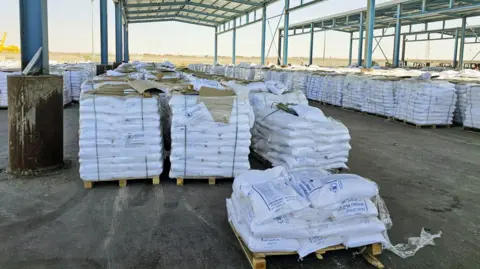
WafricNews – May 21, 2025
Despite trucks finally crossing into Gaza after nearly three months of blockade, United Nations officials report that desperately needed humanitarian aid has yet to reach civilians on the ground, intensifying international pressure on Israel.
On Tuesday, Israeli authorities confirmed that 93 trucks entered Gaza via the Kerem Shalom crossing, carrying essential supplies such as flour, baby formula, medical kits, and pharmaceutical drugs. But according to the UN, none of that aid has been delivered to the people who need it most.
UN spokesperson Stephane Dujarric said a team had waited “several hours” for clearance to access the aid, but was ultimately forced to turn back. “Unfortunately, they were not able to bring those supplies into our warehouse,” he stated.
Israel agreed earlier this week to permit what it termed a “basic amount of food” into Gaza, a territory where the threat of famine now looms large. However, the UN said the current logistics and restrictions make the operation unworkable. Aid must be offloaded on the Palestinian side of the border, then reloaded again by UN teams—only if granted access.
“This is a drop in the ocean of what’s needed,” Dujarric said, highlighting that 600 aid trucks per day would be required to address the scale of Gaza’s humanitarian crisis.

The grim reality on the ground has drawn sharp criticism from several global powers. The UK government announced it would pause trade negotiations with Israel over what Prime Minister Sir Keir Starmer described as a “morally unjustifiable” military escalation. Meanwhile, the EU has pledged to reassess its trade agreement with Israel in response to developments in Gaza.
Tom Fletcher, the UN’s humanitarian coordinator, painted a dire picture in remarks to the BBC. He warned that “14,000 babies could die in the next 48 hours unless we reach them.” While questions were raised about the accuracy of this figure, the UN clarified it was based on projections by the Integrated Food Security Phase Classification (IPC), which expects over 14,000 children under five in Gaza to suffer from acute malnutrition between April 2025 and March 2026.
UNOCHA spokesman Jens Laerke added, “We know for a fact that there are babies who are in urgent life-saving need of these supplements. If they do not get those, they will be in mortal danger.”
The situation remains critical. According to the Hamas-run health ministry, 57 children have already died from malnutrition in the past 11 weeks alone.
International response has been mixed. While some Western leaders welcomed Israel’s move to reopen aid routes, many remain unsatisfied with the pace and volume of deliveries. U.S. Secretary of State Marco Rubio called it a “positive step,” but acknowledged that the scale remains insufficient.
In a rare joint statement, the leaders of the UK, France, and Canada demanded an immediate halt to Israeli military operations and unrestricted humanitarian access to Gaza. The UK has also imposed fresh sanctions on a number of Israeli settlers and groups linked to settler violence.
The crisis stems from Israel’s ongoing military campaign in Gaza, launched in response to Hamas’s October 7 attack, which left 1,200 Israelis dead and over 250 people kidnapped. Since then, Gaza’s health ministry reports that more than 53,000 Palestinians have been killed, including 3,340 since the offensive resumed.
As Gaza's children face starvation and aid remains trapped in bureaucracy, calls are growing louder for a shift in international response—from words to action.
By WafricNews Desk.
By WafricNews Desk.


Comment
To post a comment, you have to login first
LoginNo Comments Yet...